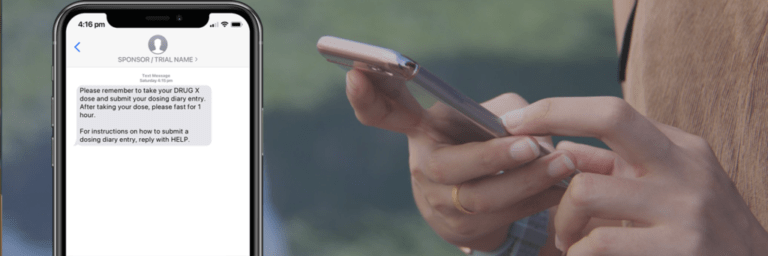
Improve Patient Outcomes with Text Messaging
Text message reminders have been shown to be an effective tool for supporting medication adherence and study compliance. Studies have found that patients who receive text message reminders are more likely to adhere to their medication regimen and complete their study participation.
One of the main reasons text message reminders are effective is that they are highly convenient for patients. Text messages are easily accessible on all mobile phones and can be received at any time, making it easy for patients to stay on top of their medication schedule and study commitments. Additionally, text message reminders can be customized to meet the specific needs of patients, such as reminding them to take their medication at a specific time of day or to attend a study visit.
Another reason text message reminders are effective is that they can help patients overcome barriers to adherence. For example, patients who forget to take their medication or miss a study visit may benefit from receiving a text message reminder. Additionally, text message reminders can help patients manage symptoms and side effects by providing them with information and resources.
Text message reminders are also cost-effective. They can be sent to a large number of patients at once and can be automated, which reduces the need for staff to manually send reminders. Additionally, text message reminders are less expensive than other methods of reminding patients, such as phone calls or mailings.
Furthermore, text message reminders have been found to be particularly effective for certain populations. For example, studies have shown that text message reminders are effective for young adults, low-income populations, and those with chronic conditions such as diabetes and hypertension. These groups often have higher rates of non-adherence, and text message reminders can help to improve their adherence. It should also be noted that there are differences in smartphone usage by demographic age group. For example in the US, smartphone penetration in the 18-49 age group is 95%. This drops down to 71% for the 50+ age group. Therefore, rather than using a mobile or web app, text messaging can reach all mobile users regardless of their age or income.
In conclusion, text message reminders are a convenient, cost-effective, and effective tool for supporting medication adherence and study compliance. They can help patients overcome barriers to adherence and manage symptoms, and have been found to be particularly effective for certain populations. As a result, text message reminders are becoming increasingly popular among healthcare providers and researchers as a way to improve patient outcomes. They can reach all mobile users regardless of their age or income and are a simple but effective way to improve medication adherence and appointment keeping.


